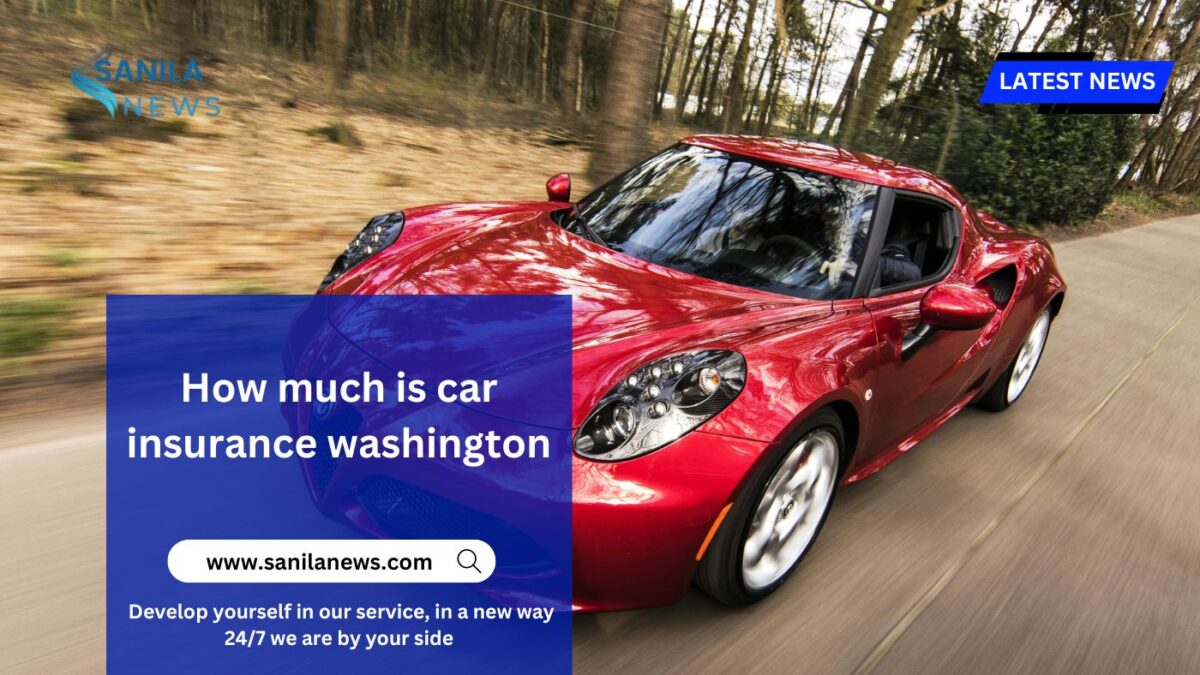How Much Is Car Insurance Washington? A Comprehensive Guide
Car insurance is a necessary expense for drivers in Washington State, as it is across the United States. The cost of car insurance can vary significantly depending on numerous factors, including your driving history, location, the type of vehicle you drive, and the coverage options you select. This guide will provide a detailed analysis of car insurance costs in Washington, exploring the factors that influence these costs and offering tips on how to get the best rates.
Overview of Car Insurance Requirements in Washington
How much is car insurance washington Before diving into the specifics of car insurance costs, it’s essential to understand the basic requirements for auto insurance in Washington. The state mandates that all drivers carry a minimum level of liability insurance, which is designed to cover damages to other people and their property in the event of an accident that you cause.
Minimum Liability Insurance Requirements in Washington:
- Bodily Injury Liability: $25,000 per person, $50,000 per accident
- Property Damage Liability: $10,000 per accident
In addition to liability insurance, Washington drivers can choose to add other types of coverage to their policies, such as:
- Personal Injury Protection (PIP)
- Uninsured/Underinsured Motorist Coverage
- Comprehensive Coverage
- Collision Coverage
These additional coverages can increase the cost of your insurance but provide greater financial protection.
Average Cost of Car Insurance in Washington
How much is car insurance washington The average cost of car insurance in Washington varies based on several factors, but generally, the state’s rates are slightly lower than the national average. According to recent data, the average annual premium for full coverage in Washington is around $1,200 to $1,400, while the average annual premium for minimum coverage is approximately $500 to $700.
Full Coverage vs. Minimum Coverage:
- Full Coverage: This typically includes liability, comprehensive, and collision coverage. It provides more extensive protection but comes at a higher cost.
- Minimum Coverage: This includes only the state-required liability coverage. It is the most affordable option but offers limited protection.
Factors Affecting Car Insurance Costs in Washington
How much is car insurance washington Several factors influence how much you will pay for car insurance in Washington. Understanding these factors can help you make informed decisions when shopping for a policy.
- Driving Record:
- Your driving history is one of the most significant factors affecting your car insurance rates. Drivers with a clean record generally pay lower premiums, while those with accidents, speeding tickets, or DUIs on their record may face significantly higher rates.
- Location:
- Where you live in Washington also plays a crucial role in determining your car insurance rates. Urban areas like Seattle, Tacoma, and Spokane tend to have higher insurance costs due to factors like traffic congestion, higher crime rates, and a greater likelihood of accidents.
- Conversely, rural areas in Washington often have lower insurance premiums because of less traffic and fewer accidents.
- Age and Gender:
- Young drivers, particularly those under 25, typically pay higher insurance rates due to their lack of driving experience and higher risk of accidents. Older drivers generally benefit from lower rates, especially if they have a long history of safe driving.
- Gender can also affect rates, with male drivers, particularly young men, often paying more than their female counterparts.
- Type of Vehicle:
- The make, model, and year of your vehicle can significantly impact your insurance costs. Expensive cars, sports cars, and vehicles with high repair costs usually come with higher insurance premiums.
- Conversely, cars with good safety ratings and low theft rates may qualify for lower premiums.
- Credit Score:
- In Washington, as in many other states, your credit score can influence your car insurance rates. Insurers often use credit scores to assess risk, with lower scores potentially leading to higher premiums. However, Washington State has implemented measures to limit the use of credit scores in determining insurance rates.
- Coverage Levels:
- The amount of coverage you choose directly affects your insurance costs. Opting for higher liability limits, adding comprehensive and collision coverage, or including optional coverages like PIP or uninsured motorist protection will increase your premiums.
- Deductibles:
- Your deductible is the amount you pay out of pocket before your insurance kicks in for a claim. Choosing a higher deductible can lower your premium, but it also means you’ll pay more out of pocket in the event of an accident.
- Annual Mileage:
- The more you drive, the higher your risk of being involved in an accident. Insurers often ask for your annual mileage and may charge higher premiums if you have a long daily commute or frequently drive long distances.
Car Insurance Costs in Major Cities in Washington
How much is car insurance washington Car insurance costs can vary widely across different cities in Washington. Here’s a closer look at the average costs in some of the state’s major metropolitan areas:
- Seattle:
- As the largest city in Washington, Seattle typically has higher car insurance rates compared to other parts of the state. The average cost of full coverage in Seattle ranges from $1,300 to $1,600 annually. Factors such as dense traffic, higher crime rates, and the cost of living contribute to these higher rates.
- Spokane:
- Spokane, located in eastern Washington, generally has lower car insurance rates than Seattle. The average annual premium for full coverage in Spokane is around $1,100 to $1,400. While it’s a large city, Spokane experiences less traffic and has lower crime rates, contributing to more affordable insurance premiums.
- Tacoma:
- Tacoma, located south of Seattle, also has relatively high car insurance costs, with average annual premiums for full coverage ranging from $1,200 to $1,500. Like Seattle, Tacoma’s proximity to urban centers, along with its own traffic and crime rates, influences insurance prices.
- Vancouver:
- Vancouver, near the Oregon border, typically has more moderate car insurance rates, with full coverage premiums averaging between $1,100 and $1,400 per year. Vancouver’s smaller size and proximity to Portland, Oregon, where insurance rates are also relatively low, help keep costs down.
- Bellevue:
- Bellevue, an affluent suburb of Seattle, often has car insurance rates similar to or slightly higher than Seattle. The average cost of full coverage in Bellevue is around $1,300 to $1,600 annually. The higher cost of living and expensive vehicles commonly owned by residents contribute to these rates.
How to Save on Car Insurance in Washington
While car insurance is a necessary expense, there are several strategies you can use to reduce your premiums in Washington:
- Shop Around:
- Different insurance companies offer varying rates, so it’s essential to compare quotes from multiple providers. Online comparison tools can make this process easier, helping you find the most competitive rates.
- Bundle Policies:
- Many insurance companies offer discounts if you bundle your car insurance with other policies, such as home or renters insurance. This can lead to significant savings.
- Increase Your Deductible:
- Opting for a higher deductible can lower your premium. However, be sure you can afford to pay the deductible out of pocket if you need to file a claim.
- Take Advantage of Discounts:
- Insurance companies offer various discounts that can help reduce your premiums. Common discounts include safe driver discounts, multi-car discounts, good student discounts, and discounts for installing safety features in your vehicle.
- Maintain a Good Credit Score:
- While Washington State has restrictions on the use of credit scores in determining insurance rates, maintaining a good credit score can still be beneficial. Pay your bills on time and keep your credit utilization low to improve your credit score.
- Drive Safely:
- A clean driving record is one of the best ways to keep your car insurance premiums low. Avoid accidents, traffic violations, and DUIs to maintain a good driving history.
- Consider Usage-Based Insurance:
- Some insurance companies offer usage-based insurance programs that track your driving habits and mileage. If you’re a low-mileage driver or have safe driving habits, you could save money with this type of policy.
- Take a Defensive Driving Course:
- Completing a defensive driving course can sometimes qualify you for a discount on your car insurance. Check with your insurance provider to see if this option is available.
- Review Your Coverage Annually:
- Your insurance needs may change over time, so it’s a good idea to review your coverage annually. If your vehicle’s value has decreased or if you’re driving less, you may be able to adjust your coverage to save money.
- Ask About Low-Mileage Discounts:
- If you drive fewer miles than the average driver, you may qualify for a low-mileage discount. Be sure to ask your insurance provider if this discount is available.
How much is car insurance washington The Future of Car Insurance in Washington
The car insurance industry is continually evolving, and several trends could impact the cost of car insurance in Washington in the coming years:
- Telematics and Usage-Based Insurance:
- Telematics, which involves monitoring driving behavior through technology, is becoming more prevalent. Usage-based insurance programs that reward safe driving with lower premiums are likely to become more popular.
- Electric Vehicles (EVs):
- As more drivers switch to electric vehicles, insurance companies are adjusting their pricing models. While EVs can be more expensive to insure due to higher repair costs, some insurers offer discounts for eco-friendly vehicles.
- Autonomous Vehicles:
- The rise of autonomous vehicles could drastically change the car insurance landscape. While fully autonomous cars are not yet widespread, their eventual adoption could lead to lower accident rates and, consequently, lower insurance premiums.
Last word
Keep an eye on our news channel Sanila News to get updated news regularly.

